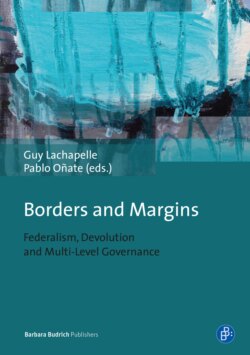Читать книгу Borders and Margins - Группа авторов - Страница 15
На сайте Литреса книга снята с продажи.
[31] Chapter 1
An Assessment of Multilevel Governance as an Analytical Concept Applied to Federations and Decentralised Unitary Systems:
Germany Versus the United Kingdom Michael Stein, University of Toronto
Lisa Turkewitsch, University of Toronto Introduction1
ОглавлениеIn two earlier papers that we presented to the 2009 Santiago IPSA Congress and the 2010 Luxembourg IPSA Conference, we argued that there appear to be broad global trends leading to the emergence of patterns of multilevel governance (MLG) in the internal intergovernmental relations of most contemporary nation-states; these apply in particular to both mature and emergent parliamentary and presidential federations, although to different degrees. We viewed these trends as a product of both contemporary forces of increasing international economic globalisation and political institutional and bureaucratic decentralisation or devolution. But in those earlier papers we did not attempt to delimit what we considered to be the fundamental defining characteristics and underlying causal or conditioning factors driving these evolving MLG trends in constitutional, institutional, cultural/attitudinal and socio-economic terms. In this paper, we propose to begin this undertaking by adopting a broad multidimensional conceptual framework and UK-German intergovernmental relations comparison presented in brief schematic form in section II below. We will apply it loosely to a comparison of two formally distinct types of political systems, one that is unitary and currently decentralised (the UK), and one that is parliamentary federal and centralised (Germany). We will also attempt to encompass these two systems within a broader typology of multitiered governance that views MLG as an overarching concept for both unitary systems and federal systems of different degrees of territorial diversity. If the MLG framework appears to fit better and account more accurately for evolving political conditions in both these countries than a traditional federalism [32] approach that relies on a unitary-federal conceptual dichotomy, then we believe that there are good reasons for considering MLG to be a superior analytical framework for contemporary intergovernmental political analysis.
